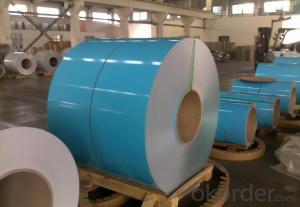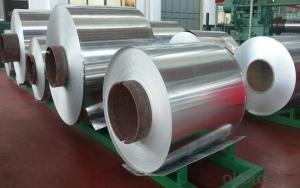Color Coated Aluminium Roll For Glass Curtain Wall Frame
- Loading Port:
- Shanghai
- Payment Terms:
- TT OR LC
- Min Order Qty:
- 2 m.t.
- Supply Capability:
- 50000 m.t./month
OKorder Service Pledge
OKorder Financial Service
You Might Also Like
Item specifice
Color Coated Aluminium Roll For Glass Curtain Wall Frame
Specifications
Grade | 1050,1060,1070, 1100, 1200, 2024,3003, 3004,3005, 3105, 5005,5052 5182,5754,8011 etc |
Thickness | 0.1~1.5mm |
Width | 100~2500mm |
Surface Treatment | PVDF and PE coated |
Temper | O-H112 |
Hardness | More than 2H |
Yield(≥MPa) | 160 |
Ultimate Strength(≥MPa) | 175 |
Elongation(≥%) | 6 |
Packing Material | Moisture-proof agent, steel tape bundle, wooden pallet, brown paper |
Method | Vertical(eye to sky) or horizontal(eye to wall) |
Standard Specification | 1000mm×C, 1200mm×C, etc |
Shipping | Container Loading or Bulk Pack |
Characteristics
1) Excellent weather-proof durability
2) Anti-ultraviolet
3) High erosion resistance
4) Stable color and gloss
5) Good mechanical processing performance
6) Abrasion resistance
7) Anti-impact
8) High flexibility
Coating varieties
Polyester Coatings (PE)
PE (polyester) coatings exhibit an excellent combination of hardness, flexibility, flow, appearance, and superior resistance to dirt retention in indoor and outdoor applications. These coatings are highly resistant to abrasion, metal marking, staining, and marring, and require minimal maintenance. Glazetech uses polyester paints which provide excellent colour and gloss retention properties.
Polyvinylidene Fluoride Coatings (PVDF)
PVDF (polyvinylidene fluoride) is a chemical resistant thick film barrier coating commonly used in architectural applications where both excellent appearance and substrate protection must be maintained over a long period of time. This coating is unaffected by most chemicals and solvents and has excellent wear and abrasion resistance. PVDF also has a high dielectric strength, excellent resistance to weathering and the ability to self extinguish.
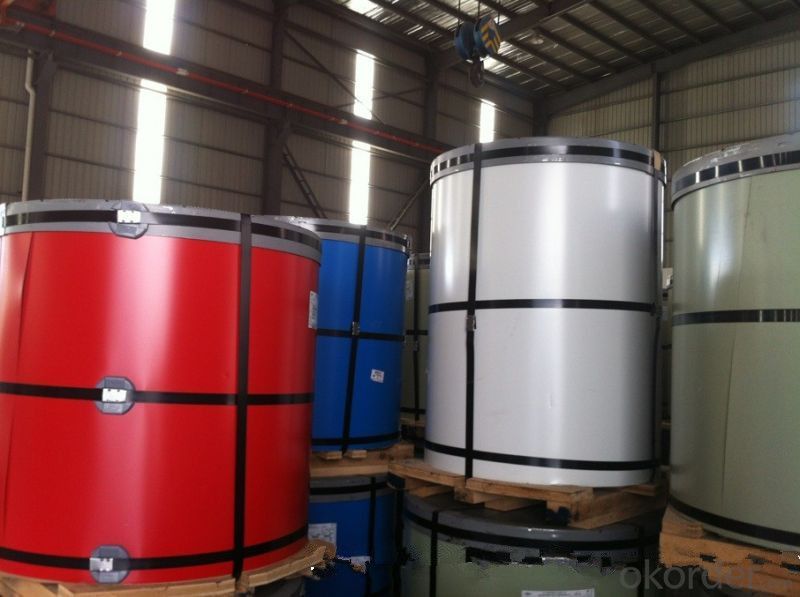
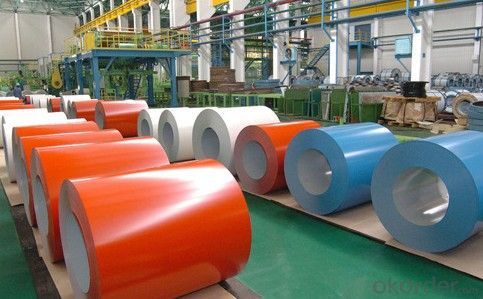
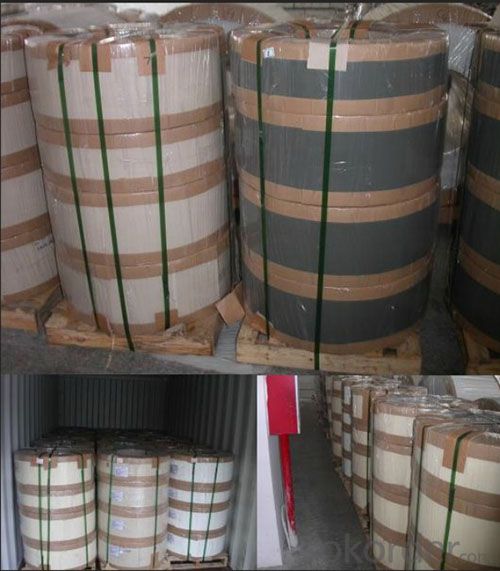
FAQ
--Q: Do you provide free samples?
--A: Yes, free samples will be sent to you on freight at destination.
--Q: Can I get your latest products catalogue?
--A: Yes, it will be sent to you in no time.
--Q: What is the MOQ?
--A: 2 tons
--Q: What are your payment terms?
--A: We accept L/C, T/T.
--Q: What kinds of alloy can you supply?
--A: 1000 series: 1050, 1060, 1070, 1100, 1145, 1200
3000 series: 3003, 3004, 3105, 3104
5000 series: 5052, 5083, 5754, 5182
6000 series: 6061, 6063, 6062, 6063
8000 series: 8011, 8021
--Q: What’s the coating of top side?
--A: PVDF and PE coating
--Q: What kinds of temper can you supply?
--A: O-H112: O,H12,H14,H16,H18,H22,H24,H26,H,32,H34,H111,H112, T3, T4, T6
- Q:What is the minimum order quantity for aluminum coils?
- The minimum order quantity for aluminum coils may differ based on the supplier and specific product requirements. Certain suppliers may set a minimum order quantity of one coil, whereas others may mandate several coils or even a full container load. To determine the minimum order quantity for aluminum coils, it is advisable to directly reach out to the supplier or manufacturer, as it can vary.
- Q:Are aluminum coils resistant to corrosion?
- Indeed, corrosion is something that aluminum coils can withstand. The reason behind this lies in the presence of a natural oxide layer on the surface of aluminum, serving as a safeguard against corrosion. When aluminum comes into contact with oxygen in the atmosphere, this oxide layer is formed. Consequently, direct interaction between the metal and moisture or other corrosive elements is prevented. Furthermore, aluminum coils can undergo additional protective measures like anodizing or painting. These measures offer an added shield against corrosion, thereby enhancing the durability of aluminum coils, making them exceptionally resistant to rust and other types of decay.
- Q:like i need a good slogan for aluminum its for a school project like for arsenic's is Arsenic's a sure fire way to deal with a rat, It works better than a mean old cat!
- Aluminum: Keeping stoners amazed for over 50 years!
- Q:Can aluminum coils be used in electrical busbars?
- Yes, aluminum coils can be used in electrical busbars. Aluminum is a commonly used material for busbars due to its high electrical conductivity, low cost, and lightweight properties. Aluminum coils can be easily formed into various shapes and sizes to fit specific busbar requirements. Additionally, aluminum has good thermal conductivity, which allows for efficient heat dissipation in high current applications. However, it is important to consider the current carrying capacity, mechanical strength, and corrosion resistance of aluminum coils when selecting them for busbar applications.
- Q:What are the common sizes of aluminum coils?
- The common sizes of aluminum coils can vary depending on the specific industry and application. However, some commonly used sizes include widths ranging from 36 inches to 72 inches, with thicknesses typically ranging from 0.019 inches to 0.125 inches.
- Q:I take an extracurricular aircraft class, and I got the okay to take some old painted sheet aluminum for another project I'm working on. The problem is, what I'm using it for I need bare aluminum. I heard around that air crafts are painted with something that regular (store-bought) paint stripper can't remove. Is this true? I am aware of the fact that stripping something like that will result in a toxic paint sludge, so I've taken precautions for that. I just need to know if heavy-duty paint stripper from Home Depot will do the job. Thanks :)
- Go to an automotive paint store like Sherwin Williams Auto Paints, buy a stripper for the type of paint on the aluminum. Many are epoxy or special acrylics like acry glo or jet glo paints and home paint strippers usually won't phase those paints. A methylene chloride mixed with a soap or wax carrier will work but is a hazmat item and has to be disposed of properly but it won't be corrosive to the aluminum. Dupont, Sherwin Williams, and others make the proper strippers. You might even find some at an RV or Boat supply.
- Q:Are aluminum coils suitable for marine applications?
- Yes, aluminum coils are suitable for marine applications. Aluminum is a corrosion-resistant material, making it an excellent choice for use in marine environments where exposure to saltwater and other corrosive elements is common. Aluminum coils are lightweight, durable, and have high strength-to-weight ratio, which is important for marine applications where weight reduction is desired. Additionally, aluminum coils can withstand extreme temperatures and have good thermal conductivity, making them suitable for various marine heating and cooling systems. Overall, aluminum coils are a popular choice in marine applications due to their corrosion resistance, durability, and lightweight properties.
- Q:What are aluminum coils?
- Aluminum coils are thin, flat pieces of aluminum that are wound in a spiral shape. They are commonly used in various industries for their versatility and durability. These coils are typically made from high-quality aluminum alloy, which makes them lightweight, corrosion-resistant, and easy to work with. Aluminum coils are used in a wide range of applications, including building and construction, automotive manufacturing, electrical appliances, and packaging. They can be further processed into different forms, such as sheets, foils, or strips, depending on the specific requirements of the industry or product. Overall, aluminum coils are an essential component in many manufacturing processes and play a crucial role in various industries.
- Q:Can aluminum coils be used for electrical conductivity purposes?
- Using aluminum coils for electrical conductivity purposes is not possible. Although aluminum is a decent conductor of electricity, it is not appropriate for coils that are specifically intended for electrical conductivity. Aluminum has a higher resistance in comparison to materials like copper or silver, which are frequently used for electrical conductivity purposes. Furthermore, aluminum has a lower melting point than copper, therefore utilizing it in coils for high electrical currents can result in overheating problems. Consequently, it is more typical to use materials such as copper or silver for electrical conductivity purposes, particularly in situations where high conductivity and low resistance are necessary.
- Q:What are the different coil slitting options available for aluminum coils?
- Aluminum coils can be slit in several ways to meet specific requirements and achieve desired outcomes. 1. The most common method is single-loop slitting, where the coil is fed through rotating circular knives to make a single cut along its length. This creates narrower coils with the desired width. 2. Double-loop slitting is similar to single-loop slitting, but the coil is passed through the circular knives twice, resulting in two narrower coils. This method is preferred when precise width tolerances are necessary. 3. Rotary slitting involves feeding the coil through rotating knives that make multiple cuts simultaneously. This allows for the production of numerous narrow strips in one pass, making it ideal for high-speed production. 4. Crush cutting utilizes opposing circular knives, with one stationary and the other rotating. The knives crush and shear the aluminum coil, providing precise slitting. This method is suitable for thin coils and applications that require minimal burr. 5. Shear slitting uses upper and lower straight knives to cut through the coil. The knives move in opposite directions, creating a shearing action that produces clean and accurate slits. This method is preferred for thicker coils. 6. Laser slitting is a modern and highly precise method that employs a laser beam to make cuts in the aluminum coil. It offers exceptional accuracy and clean edges, making it suitable for high-end applications with strict tolerances. Each of these coil slitting options possesses distinct advantages and is selected based on factors such as required width tolerances, coil thickness, production speed, and desired edge quality. Manufacturers choose the most appropriate method based on their specific needs and the characteristics of the aluminum coils they work with.
1. Manufacturer Overview |
|
|---|---|
| Location | |
| Year Established | |
| Annual Output Value | |
| Main Markets | |
| Company Certifications | |
2. Manufacturer Certificates |
|
|---|---|
| a) Certification Name | |
| Range | |
| Reference | |
| Validity Period | |
3. Manufacturer Capability |
|
|---|---|
| a)Trade Capacity | |
| Nearest Port | |
| Export Percentage | |
| No.of Employees in Trade Department | |
| Language Spoken: | |
| b)Factory Information | |
| Factory Size: | |
| No. of Production Lines | |
| Contract Manufacturing | |
| Product Price Range | |
Send your message to us
Color Coated Aluminium Roll For Glass Curtain Wall Frame
- Loading Port:
- Shanghai
- Payment Terms:
- TT OR LC
- Min Order Qty:
- 2 m.t.
- Supply Capability:
- 50000 m.t./month
OKorder Service Pledge
OKorder Financial Service
Similar products
New products
Hot products
Related keywords
